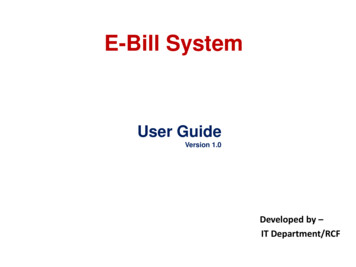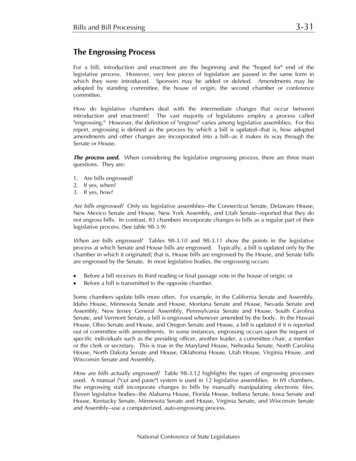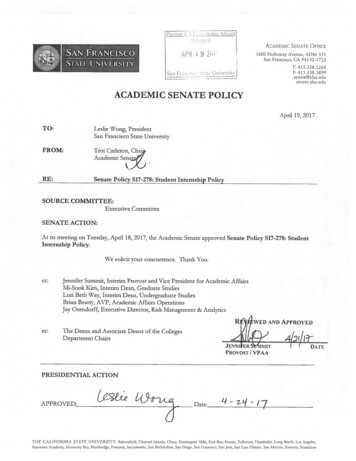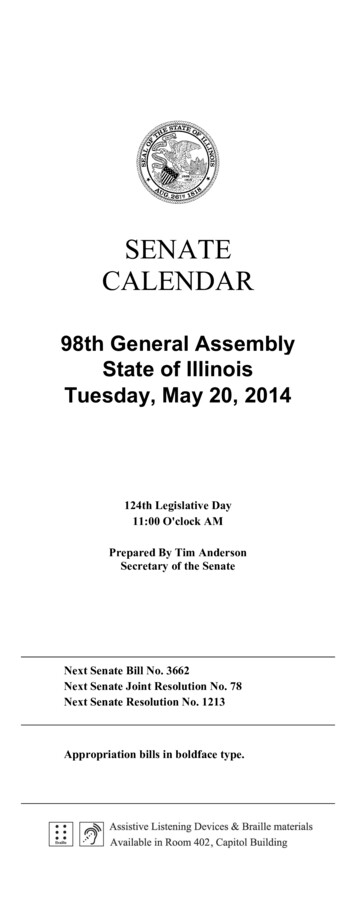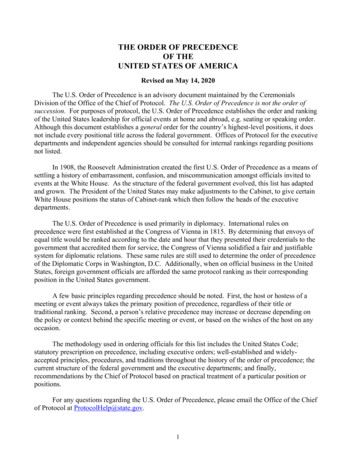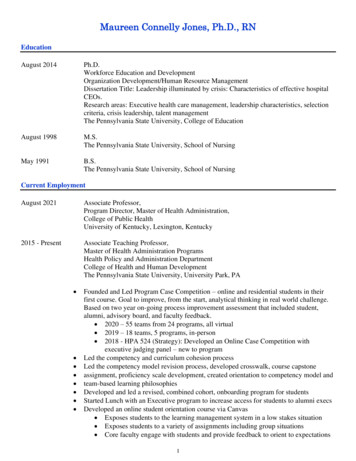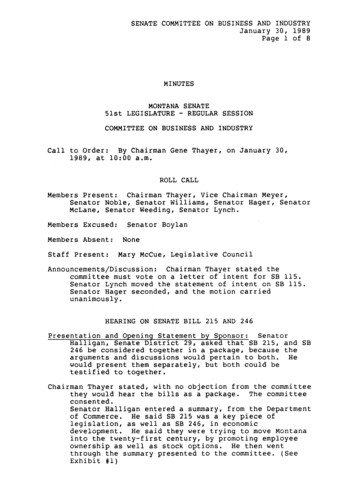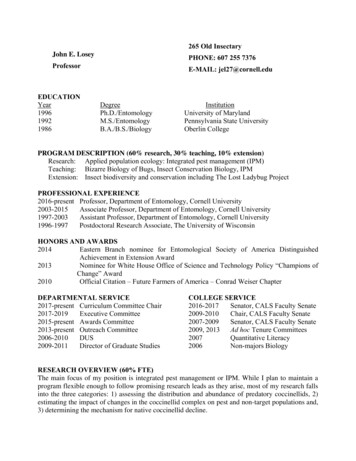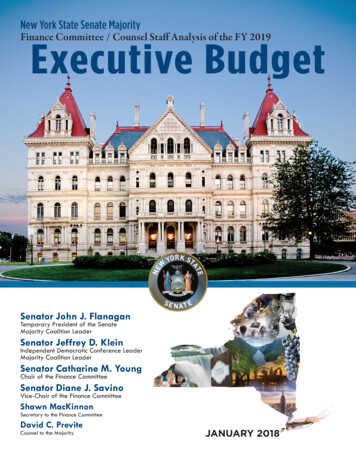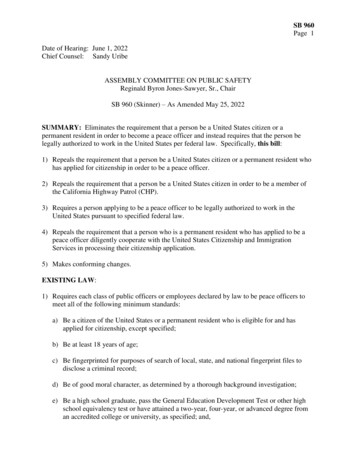
Transcription
SB 960Page 1Date of Hearing: June 1, 2022Chief Counsel: Sandy UribeASSEMBLY COMMITTEE ON PUBLIC SAFETYReginald Byron Jones-Sawyer, Sr., ChairSB 960 (Skinner) – As Amended May 25, 2022SUMMARY: Eliminates the requirement that a person be a United States citizen or apermanent resident in order to become a peace officer and instead requires that the person belegally authorized to work in the United States per federal law. Specifically, this bill:1) Repeals the requirement that a person be a United States citizen or a permanent resident whohas applied for citizenship in order to be a peace officer.2) Repeals the requirement that a person be a United States citizen in order to be a member ofthe California Highway Patrol (CHP).3) Requires a person applying to be a peace officer to be legally authorized to work in theUnited States pursuant to specified federal law.4) Repeals the requirement that a person who is a permanent resident who has applied to be apeace officer diligently cooperate with the United States Citizenship and ImmigrationServices in processing their citizenship application.5) Makes conforming changes.EXISTING LAW:1) Requires each class of public officers or employees declared by law to be peace officers tomeet all of the following minimum standards:a) Be a citizen of the United States or a permanent resident who is eligible for and hasapplied for citizenship, except specified;b) Be at least 18 years of age;c) Be fingerprinted for purposes of search of local, state, and national fingerprint files todisclose a criminal record;d) Be of good moral character, as determined by a thorough background investigation;e) Be a high school graduate, pass the General Education Development Test or other highschool equivalency test or have attained a two-year, four-year, or advanced degree froman accredited college or university, as specified; and,
SB 960Page 2f) Be found to be free from any physical, emotional, or mental condition. (Gov. Code, §1031, subds. (a)-(f).)2) Contains an exemption from the citizenship requirement for individuals employed as peaceofficers or peace officer trainees, or applicants to become a peace officer who were soemployed or had applied prior to the adoption of that requirement, provided that they applyfor and meet the requirements for United States citizenship as soon as possible. (Gov. Code,§ 1031.5, subd. (a).)3) Requires a permanent resident immigrant who is employed as a peace officer to diligentlycooperate with the United States Citizenship and Immigration Services in processing theircitizenship application, and disqualifies the person if citizenship has not been obtained withinthree years due to the officer’s failure to cooperate in the processing of the application. (Gov.Code, § 1031.5, subd. (b).)4) States that any permanent resident immigrant who is employed as a peace officer shall bedisqualified from holding that position if the officer’s application for citizenship is denied.(Gov. Code, § 1031.5, subd. (c).)5) Provides that a person shall not be appointed as a member of the CHP if they are not a citizenof the United States. (Veh. Code, § 2267, subd. (a).)FISCAL EFFECT:COMMENTS:1) Author's Statement: According to the author, “SB 960 simply removes the citizenshipprovision from the California peace officer employment requirement. It is an archaicrequirement that is not inclusive or representative of the diverse population of people thatmake up our great state. California has numerous opportunities for residents with full legalwork authorization to apply and serve in a myriad of careers. Many non-citizen residents areeligible to serve as lawyers, practice medicine as physicians or nurses, and are eligible toreceive professional licenses from the 43 CA Boards and Bureaus under the Department ofConsumer Affairs. However, there is one profession that remains out of reach for workauthorized non-citizens in California - serving as peace officers in the cities and communitieswhere they grew up. This bill would act as an effective recruitment tool for the departmentand improve the current relationship between law enforcement and communities of color byincreasing the visibility and representation of people from the neighborhood.”2) Peace Officer Citizenship Requirements: “In accordance with Government Code Section1031 and 1031.5, to be appointed as a peace officer in California, you must be a citizen of theUnited States or a permanent resident alien who is eligible for and has applied for citizenship.Citizenship status must be conferred within three years of applying for citizenship.Additional citizenship requirements are stipulated for California Highway patrol officers,who must be U.S. citizens at the time of appointment (per Vehicle Code Section nship-Requirements-FAQs)This bill would eliminate the citizenship requirement under state law for peace officers andCHP officers and replace it with a requirement that the person be legally authorized to work
SB 960Page 3in the United States per federal law.3) Citizenship Requirements Imposed by Agencies: While this bill would eliminate thecitizenship requirement under state law, it is possible that local law enforcement agencieshave their own citizenship requirements. For example, the Los Angeles Police Department’sWebsite notes, “The City of Los Angeles requires that a Police Officer candidate be UnitedStates citizen, or that a non-citizen be a permanent resident alien who, in accordance with therequirements of the U.S. Citizenship and Immigration Services (USCIS), is eligible and hasapplied for citizenship.” (https://www.joinlapd.com/qualifications)This bill does not include any provision expressly precluding local jurisdictions and agenciesfrom instituting their own citizenship requirements.4) Recruitment and Retention Issues: According to the International Association of Chiefs ofPolice, “Law enforcement agencies across the United States are struggling to recruit and hirepolice officers. Though agency-specific needs exist depending on size or locale, thedifficulty with recruitment is a significant problem that is broadly affecting the field of lawenforcement—it is not simply a result of poor agency management or localized failures.”(The State of Recuitment: A Crisis for Law Enforcement, p. 2. 239416 IACP RecruitmentBR HR 0.pdf [as of May 24, 2022.) “In September 2019, theInternational Association of Chiefs of Police conducted a membership survey to betterunderstand the extent of the recruiting crisis, the factors that underlie current difficulties,and the impact these challenges have had on agencies and the communities they serve.The IACP survey on recruitment demonstrates that the difficulty in recruiting lawenforcement officers and employees is not due to one particular cause.Rather, multiple social, political, and economic forces are all simultaneously at play inshaping the current state of recruitment and retention. They are both systemic in nature andreflect individual level considerations, making solutions to the problem particularlychallenging.” (Ibid.)Of the agencies reporting to the membership survey, 78% of the agencies reported havingdifficulty in recruiting qualified candidates, 65% of agencies reported having too fewcandidates applying, and 50% reported having to change their agency policies in order toincrease the chances of gaining qualified candidates. (The State of Recruitment: A Crisis forLaw Enforcement, supra, p. 3.)This bill would assist with expanding the eligible pool of applicants by allowing noncitizensto apply to be peace officers.5) Argument in Support: According to the University of California, the sponsor of this bill,“The University is sponsoring this bill because of our experience with students who haveparticipated in Cadet Programs with our campus police departments. In 2018, one top cadetwas tentatively offered a position with the UC Davis Police Department, but was not eligibledue to his undocumented status. Every year the University has outstanding cadets like this itcannot hire; SB 960 will remove this barrier for those seeking to serve their communities asqualified police officers.“Current law requires peace officers in California to meet several standards, including beingeither a citizen of the United States or a permanent resident who is eligible and has applied
SB 960Page 4for citizenship. This requirement is grounded in outdated thinking and serves no bona fidelaw enforcement purpose. Few other states still have statutory citizenship requirements forlaw enforcement and there are many examples of undocumented residents serving as swornpeace officers across the nation.“In recent years, California has opened many career pathways for undocumented andimmigrant residents, who may pay in-state tuition (AB 540, 2001) at UC, California StateUniversity, and the Community Colleges or be issued drivers licenses (AB 60, 2013). Theyare eligible to serve as lawyers (AB 1024, 2013), practice medicine, and to receiveprofessional licenses from the 43 boards and bureaus under the Department of ConsumerAffairs (SB 1159, 2016).“SB 960 would add to those a pathway to serve in law enforcement. The bill would notdegrade any of the standards for law enforcement officers; they must still meet stringentprofessional standards that all other officers must.“SB 960 will provide all qualified individuals in California the opportunity to serve as peaceofficers in the cities and communities where they were raised, educated and live.”6) Argument in Opposition: According to the Peace Officers’ Research Association ofCalifornia, “Although we understand the author’s intent with the bill, we have seriousconcerns that if SB 960 became law, non-United States citizens, who become peace officers,would have access to highly confidential information. Although these individuals will gothrough peace officer training, they will not have taken an oath of allegiance to the country tosupport and defend the U.S. Constitution and the laws of the United States. Furthermore, it iscritical for the safety of the public and fellow officers that substantial vetting needs to occurprior to any peace officer appointment. If a person is not a citizen of the United States, howdoes an agency secure a proper background check on an individual?”7) Related Legislation: AB 2229 (L. Rivas), reenacts the requirement that peace officers befound to be free from any physical, emotional, or mental condition that might adverselyaffect the exercise of their powers, including bias against race or ethnicity, gender,nationality, religion, disability, or sexual orientation. AB 2229 is pending in the SenatePublic Safety Committee.8) Prior Legislation:a) AB 89 (Jones-Sawyer), Chapter 405, Statutes of 2021, requires all peace officersemployed by agencies that participate in the POST program, who are not employed in orenrolled in academy for that position as of 2024, to be at least age 21 and meet specifiededucation requirements.b) SB 2 (Bradford), Chapter 409, Statutes of 2021, in pertinent part, created a process toinvestigate and determine the fitness of a person to be a peace officer and established apeace officer decertification process.c) AB 846 (Burke), Chapter 322, Statutes of 2020, required that evaluations of peaceofficers include an evaluation of bias against race or ethnicity, gender, nationality,
SB 960Page 5religion, disability, or sexual orientation.REGISTERED SUPPORT / OPPOSITION:SupportUniversity of California (Sponsor)California Police Chiefs AssociationCalifornia Public Defenders AssociationCalifornia School Employees AssociationCity of Hermosa BeachCity of Long BeachCity of OaklandOppositionCalifornia Statewide Law Enforcement AssociationCounty of KernPeace Officers Research Association of California (PORAC)Riverside County Sheriff's OfficeAnalysis Prepared by: Sandy Uribe / PUB. S. / (916) 319-3744
California School Employees Association City of Hermosa Beach City of Long Beach City of Oakland Opposition California Statewide Law Enforcement Association County of Kern Peace Officers Research Association of California (PORAC) Riverside County Sheriff's Office Analysis Prepared by: Sandy Uribe / PUB. S. / (916) 319-3744
